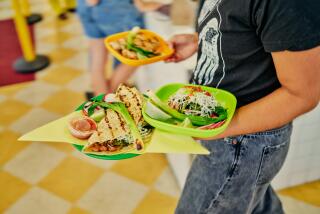Restaurant Issues Its Own ‘Deli Dollars’
- Share via
GREAT BARRINGTON, Mass. — A new kind of currency is showing up in every corner of this Berkshire Hills town--even in the church collection plate.
It’s called Deli Dollars, a limited local currency devised to try to help Frank Tortoriello move his delicatessen.
With the help of a nonprofit group called Share, which promotes the region’s economy, Tortoriello is selling notes redeemable in sandwiches or other deli fare in 1990. The bagel bucks are in the form of $10 certificates that sell for $8, or $100 worth for $75.
“I think it’s a wonderful new capitalist experiment,” said the Rev. Charles VanAusdall, who discovered one of the notes on the collection plate at the First Congregational Church.
About half of the 500 burgundy-and-cream Deli Dollars printed were snapped up within the first 10 days they were offered. The notes can be redeemed next year.
The idea is for Tortoriello to get money up front to move his business to a better site. Loyal customers get a chance to show support--and get a break on next year’s sandwich bills.
“It’s really just a gift certificate, but it’s (also) people acknowledging that they can be used more than once, can circulate more than once,” said Susan Witt, administrator of Share.
Dabbling in new forms of currency doesn’t seem to be the main interest of those who buy the coupons from the unpretentious restaurant, which serves breakfasts, deli fare, soups and sandwiches with names like “Cool Hand Cuke.”
Instead, buyers say, they want to support an institution in Great Barrington, a small town dotted with New England clapboard houses and featuring an 1895 statue of a newsboy at one of the main intersections.
“Frank’s a friend, and I’m willing to help him out,” said Ron White, owner of White Knight Records, which will accept the notes at face value toward purchases.
Share officials say that it is too soon to gauge the success of Deli Dollars as an alternative medium of exchange, but they contend that it could be a step toward regionally backed financing to spur local growth.
“One of the problems that you get with U.S. dollars is that they tend to leave the region rather quickly,” said Robert Swann.
The last effort at an alternative currency in New England occurred in the 1970s with the introduction of the Constant in Exeter, N.H. That currency was designed to be inflation-proof, said Swann, who was involved in the project.
The Constant was issued by banks in Exeter and was backed by a mix of 30 widely used commodities. The safeguard against inflation was that, if one commodity went up, it could be offset by a decrease in others.
Although the idea never really took root, from 1972 to 1974 about 200 people converted about $100,000 into Constants through local trade.
Share would like to see something similar in the Berkshires.
“We’re not advocating a departure from national currency,” Witt said. “We would like to suggest that regions could create their own currency based on something of value in that area.”
Share is accepting Deli Dollars at face value for membership in the organization. Tortoriello said he will also use them as partial payment to contractors who do some of the renovation involved in the move.
VanAusdall, who wrote about the project in his church newsletter, thinks an alternative exchange can work in a town where “we’re all friends and neighbors.”
More to Read
Inside the business of entertainment
The Wide Shot brings you news, analysis and insights on everything from streaming wars to production — and what it all means for the future.
You may occasionally receive promotional content from the Los Angeles Times.










